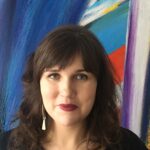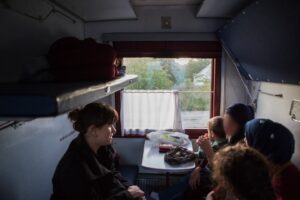The following information and answers were submitted by Sara Cincurova. She is an incoming Central and Eastern European Journalism Program (CEEJ) Fellow. The CEEJ program was postponed and the fellows will be arriving in the U.S. to begin their fellowship in the spring. Until then they will be participating in a webinar series and will be highlighted through a CEEJ blog post series. Q&A Series with CEEJ Fellows Pt 8: Sara Cincurova

What is your topic or content of interest and why?
I am a human rights journalist mostly working for print and online media as a freelancer, although I have also produced three short and medium-length documentary films. I focus mostly on humanitarian issues, migration and women’s stories, and I often investigate human rights violations. I have worked in about fifteen different countries, from France, Spain, Belarus to Venezuela.
What brought you to the area of journalism, what made you want to become a journalist, is there someone that inspired you?
I was deeply moved by Lynsey Addario’s stunning memoir, It’s What I Do: A Photographer’s Life of Love and War, as well as by the work of more experienced fellow reporters who were my mentors when I was first starting off. As a young aspiring reporter, I first witnessed displacement and humanitarian crises in Ukraine, Georgia and across refugee camps in Europe and Africa. I was deeply moved by the stories I’ve heard. I was also inspired by the courage and bravery that I have seen in the field. I’ve worked with fixers and human rights advocates that displayed an incredible amount of resilience, oftentimes in hostile environments – they were ready to face the most terrifying consequences for the sole purpose of defending human rights and establishing the truth. When I reported from Venezuela, I worked with fixers and reporters who were ready to sacrifice their lives to uphold human rights and help me report. They reported the truth at the risk of facing detention and inhumane treatment while revealing the impacts of the humanitarian and social crisis that was unfolding in their county. I wanted to share their commitment and use my voice in the field of journalism and global storytelling. I have seen so much honesty, courage, resilience, survival, humanity, friendship — all of that in hostile zones. It became an inspiration and I wanted to use my own voice to tell those stories.
Why does journalism matter?
Journalism is what matters the most in my life. I believe it can save lives, reveal human rights abuses, free victims, bring perpetrators to justice and lead to positive social change. Journalism can shed light on underreported humanitarian crises and on the countless human stories that deserve to be told. It can help policymakers as well as the general public understand the overlooked aspects of political and social issues. It can document historical events, and hold governments accountable for any misuse of power. It can also give a voice to people who are “voiceless” or left behind. It allows us to document and tell compelling, important and incredible human stories in a historical and political context. I believe that in this respect, journalism is the most beautiful profession in the world—it’s a responsibility, and a calling.

What is your primary challenge as a journalist in your country?
Quality reporting is always a big challenge. Fact-checking, bringing reliable information in real-time, showing respect and empathy to your sources at all times, not retraumatizing them, yet being able to ask difficult questions and bring about strong, compelling stories that have the power to influence policies and change things for the better — it is a very challenging but also a very important task for all journalists everywhere in the world.
What is your current understanding of freedom of the press or what does it look like in your country?
I believe it is one of the most essential parts of democracy, needed to uphold human rights.
What is the one thing you are most looking forward to during your program in the US?
I am really looking forward to working with U.S.-based newsrooms and learning new skills.
What are some of the things that have colored your impression of the U.S.?
I love American literature. I can’t wait to explore quality writing and journalism and read more stories and books.
What are you hoping to accomplish with this fellowship?
I am hoping to become a better reporter.















